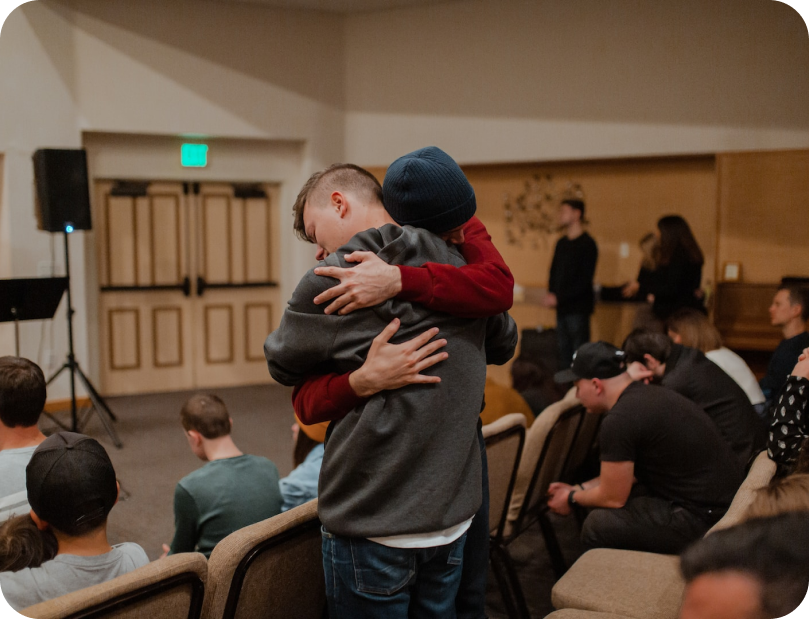Grieving can be complicated and everyone handles it a little differently. Regardless of the type of loss you’ve experienced, there is no right or wrong way to grieve. Having a little more information about grief and the grieving process can help you through the journey as you take steps toward healing.

Interested in finding a local support group box
Check out our collection of groups and resources that we recommend.
Learn MoreWhat is Grief?
Grief is a strong emotional response that is a natural reaction when you experience a loss. While grief is a very personal experience, people frequently feel numb, disconnected from daily life, and sometimes find it difficult to continue with their regular routine while managing their feelings of sadness or despair. The nature of the loss can influence the severity and duration of the grieving process, with the death of a loved one typically causing a more significant grief response than other types of loss.


The Grieving Process
Healing takes time and there is no typical path for grieving. Some people begin to feel better within a relatively short period of time, while it may take years for others to work through their own journey. It is important to remember this is a personal process and you should have patience with yourself along the way.
Some people experience the typical “five stages of grief”, which include denial, anger, bargaining, depression and ultimately, acceptance. However, you do not have to go through all of these stages in order to fully heal, and some find they never encounter these stages at all. Grieving is individual and the emotional response to grieving can also manifest in a variety of different ways. Most people feel a range of shock, disbelief, sadness, guilt, fear, and sometimes anger. There can also be physical symptoms of grief, such as fatigue, nausea, insomnia, weight loss, weight gain, and lowered immunity.
It is important to work through your feelings and take the steps necessary to find a sense of peace with your grief. There are countless resources available to help you come to terms with the loss and navigate your own journey toward healing.
Ways To Find Support During Grief and Loss
Reach Out to Friends and Family Members
While it may be natural to want to withdraw from others and hide away with your grief, having the support of those around you is an important part of healing from a loss. Sharing your feelings can lessen the burden of your grief and provide comfort from those around you, especially if they may be working through the emotions from a similar loss. Try not to isolate yourself and get as much face-to-face support as possible.
Understand Other People’s Feelings
People frequently want to provide comfort and support during a time of loss, but sometimes are unsure about how to do so or what to say. Grief can be complicated and confusing, and people often worry about doing or saying the wrong thing. Try to remember that those people reaching out to you genuinely want to help and support you.
Join a Support Group
You may find it helpful to find a group where you can share your feelings with those going through a similar experience. Some people find it helpful to join a grief support group, especially those specializing in specific types of loss, such as that of a spouse or a child. You can frequently find support groups in your area through local hospitals, hospices, counseling centers, or through the links provided below.
Take Care of Yourself
Your physical health is just as important as your mental health while working through the grieving process. The mind-body connection is strong, and people typically feel better emotionally when they feel better physically. Be sure to get enough sleep, stay active, and eat regular healthy meals. Although it may be tempting, avoid using alcohol or drugs to numb your pain or disconnect from your feelings.
Express Your Creativity or Find Another Outlet
It may be helpful to find a creative outlet to work through your grief, such as keeping a journal or a scrapbook. If you have a hobby or routine that brings you comfort, try to return to those activities that bring you joy. Remember that it is okay to find pleasure in your life as you work through the healing process.
Prepare for Hard Days and “Triggers”
Special events and milestones like anniversaries, birthdays, and holidays can be especially emotional after a loss. It is normal and expected that these days may be harder and bring up stronger feelings of grief. Plan ahead and prepare for these moments. You may find it helpful to celebrate your loved one in a special way and create a new tradition to mark the occasion.
Find a Therapist or Grief Counselor
If you are really struggling to overcome your feelings of sadness and despair, you may consider finding a local therapist or counselor who is experienced in grief counseling. Working with a mental health professional is often a key step in overcoming obstacles and successfully working through grieving.



